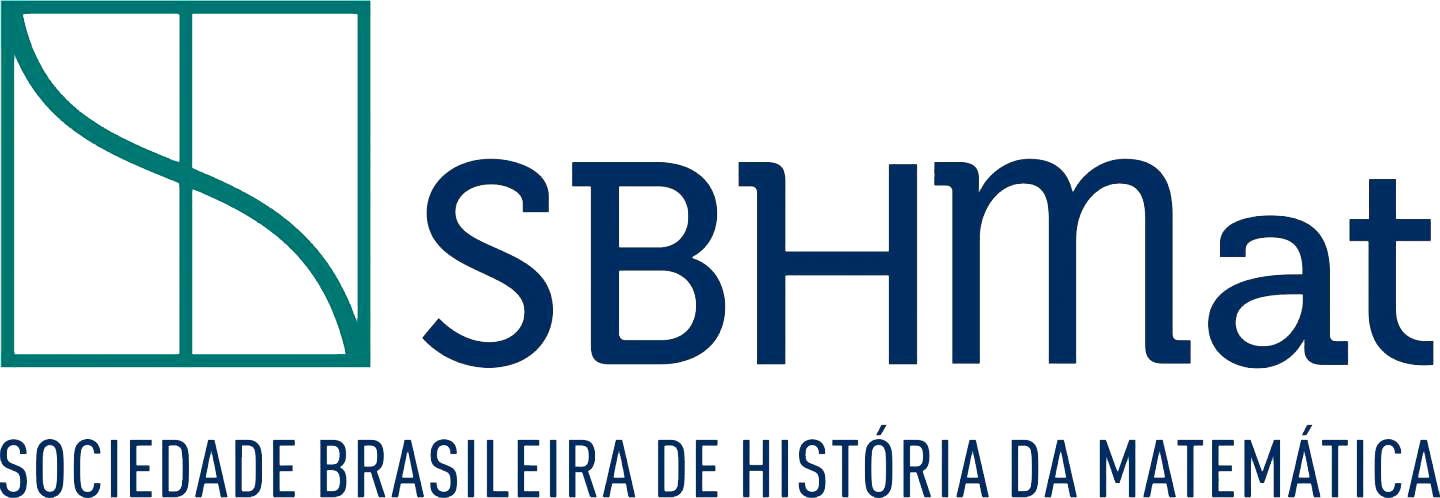Gresham College e a matemática prática de Londres no século XVII
DOI:
10.47976/RBHM2022v22n4567-81Palavras-chave:
Gresham College., História da Matemática., Matemática Prática.Resumo
Pesquisas com foco em história da matemática, especialmente voltadas para a Inglaterra do século XVII, destacam as questões políticas e a fagulha inicial da revolução industrial. Nesse entorno, há outros aspectos que fizeram parte, como a valorização dos estudos sobre matemática prática. Nesse viés, o artigo objetiva conhecer o Gresham College e sua relação com a matemática prática do seculo XVII em Londres. Dessa maneira, são explorados as perspectivas as quais necessitaram que houvessem um estudo árduo sobre a matemática prática no século XVII, o trânsito de conhecimento na cidade londrina e a relação do Gresham College nesse cenário de ascenção das práticas no território inglês. Percebe-se que esse College teve influência em duas frentes em relação as matemáticas, uma voltada para o ensino e outra associada as relações sociais e intectuais de estudiosos europeus do período.
Downloads
Métricas
Referências
ADAMSON, I. R. 1980. The Administration of Gresham College and its Fluctuating Fortunes as a Scientific Institution in the Seventeenth Century. In: History Of Education, [S.L.], v. 9, n° 1, 13-25.
AMES-LEWIS, Francis. 2016. Sir Thomas Gresham and Gresham College: studies in the intellectual history of London in the sixteenth and seventeenth centuries. New York: Routledge.
ASH, Eric H. 2004. Power, Knowledge, and expertise in Elizabethan England. [S.I.]: The Johns Hopkins University Press.
BENNETT, Jim. 2003. Knowing and doing in the sixteenth century: what were instruments for?. The British Journal For The History Of Science, [S.L.], v. 36, nº 2, p. 129-150.
BURGON, John William. 1839. The life and times of Sir Thomas Gresham, KNT. London: Effinghan Wilson.
CHARTRES, Richard; VERMONT, David. 1998. A brief history of Grasham College 1597-1997. [S.I.]: Gresham College.
CORMACK, Lesley B. 2017. Mathematics for Sale: Mathematical Practitioners, Instrument Makers, and Communities of Scholars in Sixteenth-Century London. In: CORMACK, Lesley B.; WALTON, Steven A.; SCHUSTER, John A. (ed.). Mathematical Practitioners and the Transformation of Natural Knowledge in Early Modern Europe. 45. ed. Cham: Springer.
COTTER, Charles H. 1981. Edmund Gunter (1581–1626). Journal Of Navigation, [S.L.], v. 34, n° 3, 363-367. Disponível em: https://www.cambridge.org/core/journals/journal-of-navigation/article/edmund-gunter-15811626/842FBA9BED16ABDA5B562A793C8036E7. Acesso em: 09 set. 2020.
FEINGOLD, Mordechai. 1984. The mathematicians' apprenticeship: science, universities and society in England, 1560-1640. Cambridge: Cambridge University Press.
HACKETT, Maria. 1833. A brief memoir of sir Thomas Gresham; with an abstract of his Will, and of the act of parliament, for the foundation and government of Gresham College. London: J. F. And G. Rivington, St. Paul'S Churchyard; And Smith, Elder And Co., Cornhill.
HARKNESS, Deborah E. 2007. The Jewel House: Elizabethan London and the Scientific Revolution. London: Yale University Press.
HARTLEY, Harold; HINSHELWOOD, Cyril. 1961. Gresham College and the Royal Society. In: Notes And Records Of The Royal Society Of London, [S.L.], v. 16, n° 1, 125-135. Disponível em: https://royalsocietypublishing.org/doi/10.1098/rsnr.1978.0001. Acesso em: 09 set. 2020.
HAVIL, Julian. 2014. John Napier: life, logarithms, and legacy. Princeton: Princeton University Press.
HIGTON, Rester Katharine. 1996. Elias Allen and the Role of Instruments in Shaping the Mathematical Culture of Seventeentli-Century England. 1996. 329 f. Tese (Doutorado) - Curso de Doctor Of Philosophy (phd), Department Of The History And Philosophy Of Science, University Of Cambridge, Cambridge, 1996. Disponível em: https://doi.org/10.17863/CAM.16170. Acesso em: 31 maio 2020.
JOHNSON, Francis R. 1940. Gresham College: precursor of the royal society. Journal Of The History Of Ideas, [S.L.], v. 1, nº 4, 413-438.
MCKIE, Douglas. 1960. The origins and foundation of the Royal Society of London. Notes And Records Of The Royal Society Of London, [S.L.], v. 15, nº 1, 1-37. Disponível em: https://royalsocietypublishing.org/doi/10.1098/rsnr.1960.0001. Acesso em: 24 ago. 2020.
PATERSON, Daniel. 1785. Paterson's British Itinerary, being a new and accurate delineation and description of the direct and principal cross Roads of Great Britain.
ROSS, Richard P. 1975. The Social and Economic Causes of the Revolution in the Mathematical Sciences in Mid-Seventeenth-Century England. In: Journal Of British Studies, [S.L.], v. 15, nº 1, 46-66.
SAITO, Fumikazu. 2015. História da matemática e suas (re) construções contextuais. São Paulo: Livraria da Física.
TAYLOR, Eva Germaine Rimington. 1968. The mathematical practitioners of Tudor and Stuart England. Cambridge: At The University Press.
VAN HELDEN, Albert; HANKINS, Thomas L. 1994. Introduction: instruments in the history of science. Osiris, [S.L.], v. 9, p. 1-6.
WATERS, David D. 1958. The art of navigation in England in Elizabethan and early Stuart times. London: Hollis And Carter.
Downloads
Publicado
Métricas
Visualizações do artigo: 648 PDF downloads: 389




































